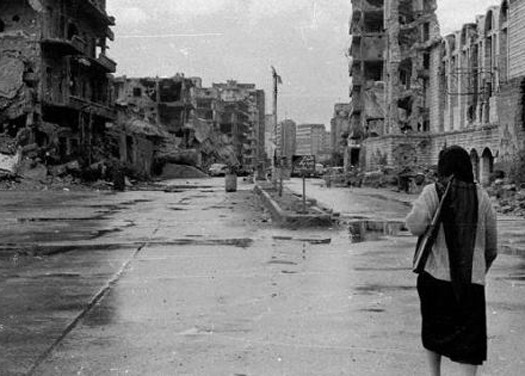Photo from the documentary Badna Naaref. (Ramzi Haidar)
Lebanon’s complicated past includes a legacy of war, occupation, and assassinations. The period between 1975 and 1990 included waves of daily bombings and protests. Over 100,000 civilians were killed and approximately 17,000 were disappeared.
Despite the overwhelming percentage of Lebanese who were affected by the war, the crimes of the past have not been seriously or transparently addressed, and discussion of Lebanon’s past is largely absent from public spheres.
Today, Lebanon's youth are beginning to ask why their country remains silent about its past.
This question drives a new documentary film presenting the stories of youth in Lebanon as they set out to seek the truth. Directed by Lebanese filmmaker of Palestinian origin Carol Mansour, Badna Naaref —or “We Want to Know”— narrates their journey through memories of the war in Lebanon as seen through the eyes of their parents and relatives.
“In our family, we do not talk about the civil war; maybe because no one was directly hurt by the war or affected by it,” says Drucella Tabari, a student who took part in the project.
Student Carine Abou Assali reports a similar experience. “Every time I asked anyone they would say ‘it’s over, good that it passed,’ but they wouldn’t give me any details.”
The students say they fear the recurrence of political violence, and believe that the most important lesson from the war is the need to prevent its repetition.
Talking about the past has helped participating students understand the consequences of not addressing a legacy of human rights violations. “What affected me the most from what I heard that after all those years, the tragedies are still present in people’s hearts, they are still in pain,” says Alina Hajemian.
The Badna Naaref documentary complements the website that was launched as part of the same project. It will be disseminated to schools across Lebanon for use as an educational tool.
“Disseminating the documentary in schools will help break the wall of silence and open up dialogue about the past,” said Head of ICTJ’s Lebanon Program, Carmen Abou Jaoudé. “It can raise awareness among the youth about the catastrophic results of war and can help prevent the repetition of the violence of the past.”
The "Talking between Generations" project was implemented by ICTJ together with UMAM Documentation and Research, UIR Memoire at the at the Center for the Study of the Modern Arab World (CEMAM) at Université Saint-Joseph, Al-Jana, and ACT for the Disappeared, in consultation with the Lebanese Ministry of Education. The project was funded by the European Union and the Embassy of Switzerland in Lebanon.
